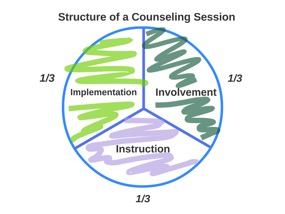by Greg E. Gifford, PhD
Every counseling session has a goal. If you’re meeting with a counselee for the first time, you are seeking to gain a trusting relationship, instill hope, and gather data. However, if this is your twelfth time meeting with a counselee, you are looking to assign homework and help them assimilate into life in their local church. All counseling sessions have a structure—or should—and as a biblical counselor we learn this rhythm of managing the structure of our sessions with the Key Elements of Biblical Counseling. In this blog, I’ll give you a few thoughts for managing the structure of your counseling session.
First of all, you must begin with a working knowledge of the key elements of biblical counseling: build involvement, instill hope, gather data, interpret the problem, instruct biblically, and assign homework. These elements will inform the entirety of your counseling with an individual. If you’re a bit rusty on these, you really do need to pause and give them a refresher in your study. A great resource to help you will be Counseling: How to Counsel Biblically in which Wayne Mack provides a detailed articulation of the key elements in the form of the “8 I’s.”
Overall Structure of Counseling
After you’ve revisited the key elements, let me describe how the key elements correspond to your counseling sessions using a 12-session model:
- Session 1-3: These are filled with gaining involvement from your counselee, instilling hope, data gathering, and discerning the problem. Although you’ll offer biblical instruction and share the gospel with your counselee, the predominant key elements will be involvement, hope, and discernment of the problem.
- Sessions 4-8: By this point you’ve established hope and involvement, so your focus is on biblical instruction and assigning homework. In this phase of your counseling, you are taking what you heard in your initial sessions and forming a plan to address these issues biblically. We would see a fair amount of biblical instruction and homework in every one of these sessions.
- Sessions 8-12: Undoubtedly you will maintain a relationship with your counselee, but toward the end of counseling you already have established that relationship. Thus, you’re seeking to have your counselee implement what you’ve taught them throughout the process. You will have instructed them in sessions 4-8 and are now pressing them to implement through practical homework assignments.
Structure of Individual Sessions
Now this is the general flow of your counseling: Involvement to Integration. However, each session is also informed by the Key Elements. For instance, see the below chart:
Even in the management of your time, you will incorporate the key elements of biblical counseling in individual sessions. This means roughly one-third of your time will be gaining involvement and following up on homework. Then you will transition to biblical instruction where you will take one-third of your time to teach from God’s word. Finally, you will assign homework through implementation. If any of us were to shadow each other in our counseling, we would see that a fourth session would look roughly like this pie chart in our session’s structure. The key elements inform the structure of our individual counseling sessions, too.
Implications to Consider
There are a few things as biblical counselors that we need to keep before us with the structure of the counseling sessions. First of all, there is a structure. We have a goal and are working toward that goal. None of our sessions should be aimless, wandering through the problems of our counselee. In sessions with a biblical counselor, you should encounter some of the same structure for the structure of sessions. We are purposefully on track to accomplish our goals in counseling as it pertains to the presenting problem.
Secondarily, counselors are the one’s managing sessions. If you have a talkative counselee or non-compliant counselee, it will prevent you from accomplishing what you must as a biblical counselor. The counselor must manage the overall flow of sessions and the structure of individual sessions. If you are naturally timid or soft-spoken, then you must grow in this assertiveness so that you can actually manage your counseling sessions. Otherwise, you’ll get distracted, side-tracked, or simply re-routed.
Finally, this standardization of counseling helps provide a teachable, duplicable structure for the next generation of counselors. This allows for education and evaluation. Meaning, how do we know you’re on track in counseling? Well, we can look at the key elements of counseling and see where you are at in the process. Furthermore, when a new counselor asks what their third session should be about, we can help them discern what they should be accomplishing. It does feel a bit like the Wild West if we, as biblical counselors, are all approaching counseling in a methodologically different way. A counselee could have two very different experiences in meeting with two different biblical counselors.
Clarification and Conclusion
The more you counsel, the more you recognize that your sessions will have some structure. The question is what will be the structure and how will you manage your structure appropriately? The key elements of biblical counseling are axiomatic to understanding the biblical counseling process and helping effectively minister God’s Word to people’s lives. From an individual session, to the overall progression of your sessions, these key elements are of great importance. Thus, use the key elements to structure your session and help you evaluate your own progress in counseling. If you get rusty in understanding the key elements, you will get rusty in the practice of the key elements.
This blog was originally published for The Center for Biblical Counseling and Discipleship.



